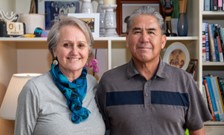Foster Caregiving
On this page
- Need for foster caregivers
- Who can be a foster caregiver?
- What do foster caregivers do?
- What qualities do we look for in foster caregivers?
- How are foster caregivers supported?
- Steps to becoming a foster caregiver
- Caregiver Stories
- Resources
We have an urgent need for foster caregivers.
The need for all types of caregivers is high. We have an urgent need for, and will prioritize, applicants who:
- Have capacity to provide care for sibling groups
- Are passionate about caring for youth
- Are interested in supporting children and youth who identify as LGBTQ2S+
- Identify as Indigenous
- Are skilled in caring for individuals with complex support needs
- Are able to provide weekend respite care for children and youth
Who can be a foster caregiver?
Foster caregivers come from a variety of backgrounds, with different life experiences, skills, and qualities. They share a few things in common:
- Have a strong desire to support families in their community by providing temporary care to children and youth who are unable to live with their parents or extended family
- Support children and youth to maintain connections with family, extended family, and other important people in their lives, as well as maintain connections to their culture and community
- Work collaboratively with the child or youth’s care circle to implement a child or youth’s care plan Have homes that are physically and culturally safe and nurturing
- Are open to learning new caregiving skills, and understand (or are willing to learn) the importance of attachment, belonging and identity
- Are residents of B.C. who and are at least 19 years of age
“Foster caregivers carry out caregiving responsibilities for children and youth who are in the care of the Province.”
What do foster caregivers do?
Foster caregivers carry out caregiving responsibilities for children and youth who are in the care of the Province. Care is provided through an agreement that sets out standards and requirements designed to support high quality care and service to children, youth, and families.
Caregivers provide day-to-day care to a child or youth while keeping them connected with their parents, family and community. Maintaining family ties and cultural identity is crucial in developing a child or youth’s sense of belonging and identity.
When a child or youth cannot live at home, inclusive foster care is critically important. The goal of inclusive care is for the child or youth to return to the care of their parents or family. Inclusive foster care is a partner- ship between the child or youth’s family, the foster caregiver and Ministry of Children and Family Development (MCFD) or an Indigenous Child and Family Services (ICFS) Agency, sharing responsibility for the care of the child or youth, and where parents and kin are meaningfully involved in their care. If a child or youth is Indigenous, their Nation is also part of this partnership.
Do you think you may be able to provide care for a child or youth? Contact B.C. Foster Parents Association or Indigenous Perspectives Society (see Step 1 below) to learn more.
You can also email the MCFD Centralized Retention and Recruitment Team (CRRT) at MCF.CentralizedRetentionandRecruitment@gov.bc.ca with your full name and contact number.
What qualities do we look for in foster caregivers?
- Nurturing – you are warm and accepting of children, youth and families; you create a sense of belonging in your home and family while also nurturing the connections the child or youth has to their family and other important people in their lives
- Openness – you provide a sense of safety and belonging; nurturing a child or youth’s sense of self, including cultural, racial, religious, gender, sexual identity
- Flexibility – you provide care according to a child or youth’s needs
- Curiosity – you are open to learning opportunities that enhance and support your role as a caregiver; you are excited to learn about diverse cultures, needs and families
- Inclusivity – you embrace a team approach to caregiving and partnership where parents, kin, caregivers and MCFD/ICFS Agency social workers support each other in the care of a child or youth
- Trauma Informed – you understand or are willing to learn about how trauma impacts families and how trauma heals within safe relationships
- Bravery – you are willing to ask for and accept support
“While a child or youth cannot live at home, inclusive foster care is critically important. The goal of inclusive care is for the child or youth to return to the care of their parents or family.”
How are foster caregivers supported?
Supports for foster caregivers and the children and youth they care for include:
- Monthly payments to cover the day-to-day costs of caring for the child or youth Insurance
- Training
- Eligibility for childcare subsidy
- Extended health and dental coverage for the child or youth
- Local and provincial caregiver support to help you get to know other foster caregivers
- Some caregivers may be eligible for service payments, in addition to maintenance payments, based on their skills, experience, and type of care and services that they provide
Care Circle
Children and youth in care are supported and surrounded by a care circle.

Child or Youth
Child or Youth's Family
Foster Caregiver's Social Worker
Child or Youth's Social Worker
Other Support Dependent on the Child or Youth's Needs
Steps to becoming a foster caregiver
1. Submit Request
To submit your request, please call:
- B.C. Foster Parents Association: 1-800-663-9999, Mon. to Fri., 8:30 a.m. – 4:00 p.m.
- Indigenous Perspectives Society: 250-857-4969
You will be asked to provide some basic information that will be shared with the recruitment office in your area.
2. Attend an Information Session
Information sessions are designed to help you, and your family make decisions about applying to become foster caregivers.
You will be contacted and invited to an information session.
3. Submit an Application
After attending an information session, submit your completed application to become a foster caregiver.
The application screening process includes:
- Personal reference checks
- A medical assessment
- A criminal record check for the caregiver and all those 18 years of age or older who are living in the home or who may have significant and unsupervised access to the child/youth
- A review of records to check for previous child welfare involvement
- Background and possible criminal record checks, for any time spent residing outside of B.C. for more than 6 months.
Guidance on how to complete these checks, and financial support may be available once you submit your application.
Criminal or child welfare records and/or health concerns do not automatically prevent you from becoming a caregiver. The assessment considers historical context and current situation.
4. Complete Pre-Service Training
Foster caregiver applicants are required to complete training before receiving approval as a foster caregiver.
This online training takes approximately 35 hours to complete and is self-paced over a 12-week period. Learners are supported by specialized facilitators.
An assigned resource worker will register foster caregiver applicants for this training.
5. Home Visit(s) to Start Home Study
A resource worker will complete several in-home interviews with prospective caregivers.
Many topics are discussed during the home studies, such as:
- History and personal characteristics of caregiver applicants
- Parenting style and skills or work experience with children and youth
- Family and partner relationships, other personal supports
- Lifestyle, schedules, and commitments
- Community and cultural involvement, spiritual beliefs
- Home environment
- Willingness to collaborate and connect with resource workers, a child or youth’s family, and a child or youth’s Indigenous community (if a child or youth in the home is Indigenous).
Once the home study is complete, it will be reviewed and signed off by the applicants.
If your application is approved, your foster home will be opened, and you will be considered for potential placements.
Caregiver Stories
Resources
- BC Foster Parents Association
- Indigenous Caregivers of BC
- Representative for Children and Youth - Belonging
- The Federation of Community Social Services of BC






